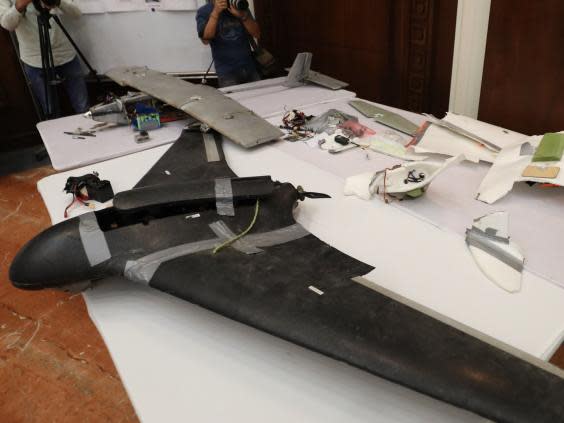Drone attack on Saudi oil pipeline claimed by Houthis as questions linger over 'ship sabotage'
Yemen's Houthi rebels attacked a major oil pipeline in Saudi Arabia with explosive-laden drones on Tuesday, just days after an alleged sabotage of Saudi oil tankers off the coast of the United Arab Emirates.
“Our goal is to respond to the crimes they are committing everyday against the Yemeni people,” said Houthi spokesperson Mohammed Abdel-Salam.
“This is a message to Saudi Arabia, stop your aggression.”
Saudi Arabia has been at war with the Iran-backed Houthi rebels in Yemen since March 2015 in a devastating war that has left over 13 million on the brink of famine.
Saudi energy minister Khalid al-Falih said drones attacked two petroleum pumping stations supplying a pipeline running from its oil-rich Eastern Province to the Yanbu Port on the Red Sea, but caused only "minor damage".
A fire broke out later but firefighters were able to bring it under control, though the state-run Saudi Aramco stopped pumping oil through the pipeline.
"These attacks prove again that it is important for us to face terrorist entities, including the Houthi militias in Yemen that are backed by Iran," Mr Falih said, in a statement carried by the state-run Saudi Press Agency.
The kingdom’s state security body also said two petroleum pumping stations in the greater region of Riyadh, the landlocked capital, were targeted at the same time.
Mr Falih called the attack a “cowardly” act of terrorism, saying recent sabotage acts against the kingdom’s vital installations not only target Saudi Arabia, but the safety of the world’s energy supply and global economy.
Benchmark Brent crude traded at $71 (£55) a barrel on Tuesday, up $1.27 (£1) on the day.

On Sunday, two Saudi, one Norwegian and one Emirati oil tanker were allegedly attacked off the coast of the UAE port city of Fujairah, though Gulf officials have declined to say who they suspect was responsible.
The US had warned sailors “Iran or its proxies” could be targeting maritime traffic in the region, and is deploying an aircraft carrier and B-52 bombers to the Persian Gulf to counter alleged threats from Tehran.
A US official in Washington said that an American military team’s initial assessment indicated Iran or Iranian allies used explosives to blow holes in the ships.
The United Nations meanwhile called on “all concerned parties to exercise restraint for the sake of regional peace, including by ensuring maritime security” and freedom of navigation.
Tensions have been high since Donald Trump withdrew America from the 2015 nuclear accord between Iran and several other world powers and restored US sanctions that pushed Iran’s economy into crisis.
The Trump administration is also reportedly considering a plan to send up to 120,000 troops to the Middle East if Iran attacks US forces or accelerates its work on nuclear weapons.
Last week, Iran warned it would begin enriching uranium at higher levels in 60 days if no new deal was reached.
Additional reporting by agencies

